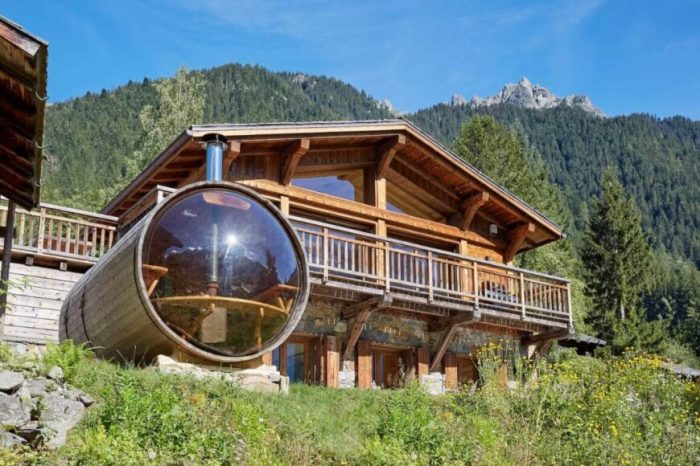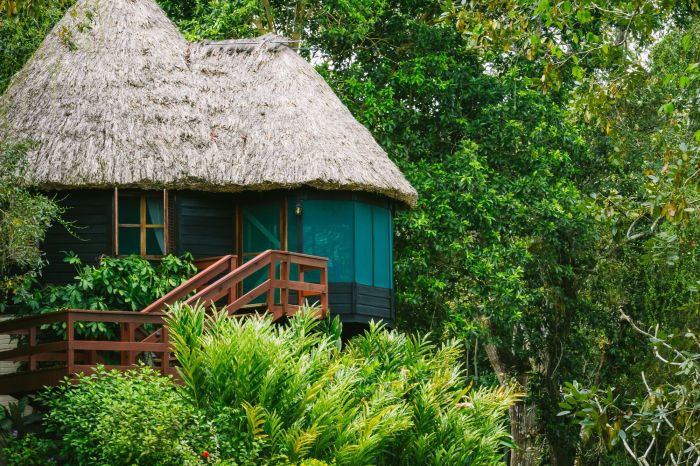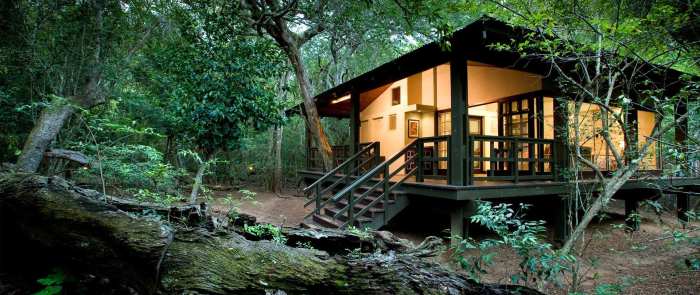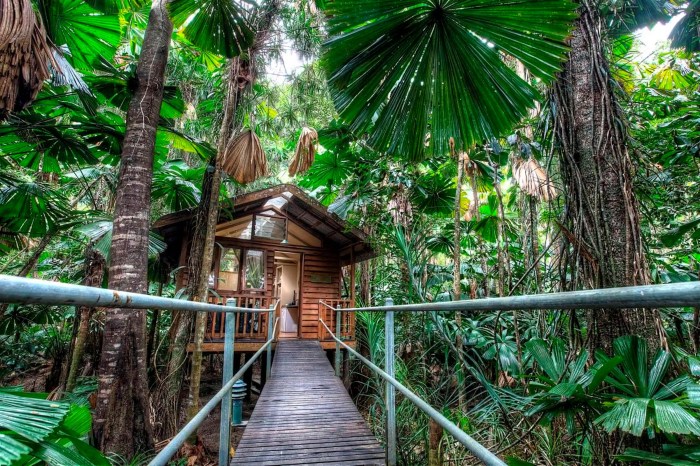Eco-lodges, a unique blend of environmental sustainability and luxurious accommodations, are emerging as the preferred choice for travelers seeking an immersive and responsible travel experience. These havens of tranquility offer a harmonious coexistence with nature, promoting conservation efforts while providing an unforgettable escape for guests.
From secluded rainforest retreats to mountain sanctuaries and coastal escapes, eco-lodges embrace eco-friendly practices, utilizing renewable energy sources, implementing water conservation techniques, and employing sustainable building materials. Their commitment to environmental stewardship extends to the surrounding ecosystems, supporting local communities and preserving biodiversity.
Eco-Lodges: A Sustainable Accommodation Experience

Eco-lodges are a type of accommodation that emphasizes environmental sustainability. They are designed and operated in a way that minimizes their impact on the natural environment and promotes conservation. Eco-lodges often use renewable energy sources, such as solar or wind power, and incorporate sustainable building materials and practices. They also typically have programs in place to reduce water consumption, waste production, and pollution.
Staying in an eco-lodge can be a great way to experience nature while also supporting sustainable tourism. Eco-lodges often offer unique opportunities to learn about the local environment and culture, and they can provide a sense of peace and tranquility that is hard to find in more developed areas.
Benefits of Staying in Eco-Lodges
There are many benefits to staying in eco-lodges, both for travelers and for the environment.
- For travelers: Eco-lodges offer a unique and immersive experience that allows travelers to connect with nature and learn about the local environment. They can also provide a sense of peace and tranquility that is hard to find in more developed areas.
- For the environment: Eco-lodges help to protect the environment by reducing their impact on natural resources and promoting conservation. They can also help to raise awareness of environmental issues and inspire travelers to make more sustainable choices.
Types of Eco-Lodges

Eco-lodges are designed to offer an immersive and sustainable accommodation experience in pristine natural environments. They can be categorized based on their location, each offering unique characteristics and amenities.
Here are the main types of eco-lodges:
Rainforest Eco-Lodges
Nestled amidst lush rainforests, these eco-lodges provide a chance to connect with the vibrant biodiversity of the jungle. They often feature elevated treehouses or cabins, offering panoramic views of the surrounding canopy. Rainforest eco-lodges typically offer guided nature walks, wildlife safaris, and opportunities for birdwatching.
- Examples: Inkaterra Reserva Amazonica, Peru
- Gaia Amazon Lodge, Ecuador
Mountain Eco-Lodges
Located in mountainous regions, these eco-lodges provide stunning vistas and access to alpine adventures. They offer cozy accommodations with fireplaces or wood-burning stoves for warmth, and some even feature outdoor hot tubs or saunas. Mountain eco-lodges often offer hiking trails, rock climbing, and skiing or snowboarding opportunities.
- Examples: El Chalten Eco Camp, Argentina
- Camp Glenorchy Eco Retreat, New Zealand
Coastal Eco-Lodges
Situated along coastlines, these eco-lodges offer breathtaking ocean views and access to marine ecosystems. They often feature private balconies or patios where guests can enjoy the sounds of crashing waves. Coastal eco-lodges may offer kayaking, snorkeling, diving, or fishing excursions.
- Examples: Turtle Inn, Belize
- Six Senses Zil Pasyon, Seychelles
Design and Construction of Eco-Lodges

Eco-lodges adhere to sustainable design and construction principles to minimize environmental impact and promote harmony with the surrounding ecosystem. These principles guide the selection of materials, construction methods, and architectural designs.
The use of eco-friendly materials, such as sustainably harvested wood, recycled glass, and bamboo, reduces the carbon footprint of construction. These materials possess natural insulation properties, reducing energy consumption and enhancing indoor air quality.
Energy-Efficient Systems, Eco-lodges
Eco-lodges employ energy-efficient systems to reduce their reliance on non-renewable resources. Solar panels, wind turbines, and geothermal heating/cooling systems generate renewable energy, reducing greenhouse gas emissions. LED lighting, energy-saving appliances, and efficient insulation further contribute to energy conservation.
Eco-lodges, renowned for their sustainable practices, offer an immersive experience in nature’s embrace. While planning your eco-friendly beach getaway, don’t forget to check our beach holiday packing list to ensure you have all the essentials for a comfortable and eco-conscious stay.
Eco-lodges prioritize the well-being of the environment, inspiring us to adopt sustainable practices even on our vacations.
Water Conservation Techniques
Water conservation is crucial in eco-lodges, especially in arid or semi-arid regions. Rainwater harvesting systems collect and store rainwater for non-potable uses, such as irrigation and cleaning. Low-flow fixtures, dual-flush toilets, and water-efficient landscaping minimize water consumption, reducing the strain on local water resources.
Innovative Architectural Designs
Eco-lodges showcase innovative architectural designs that blend with the natural environment. Green roofs, which are covered in vegetation, provide insulation, reduce stormwater runoff, and create habitats for wildlife. Passive solar design optimizes natural light and ventilation, reducing the need for artificial lighting and air conditioning.
Eco-lodges are becoming increasingly popular for travelers seeking a more sustainable and immersive travel experience. These lodges often offer unique accommodations and activities that highlight the local environment and culture. While eco-lodges may not offer the same level of luxury as luxury beach resorts , they provide an authentic and eco-friendly alternative that is perfect for those who want to connect with nature.
Examples of eco-lodges with innovative designs include:
- Treehotel in Sweden, where rooms are suspended among the trees.
- The Green Village in Bali, Indonesia, which features bamboo architecture and a focus on sustainability.
- Fogo Island Inn in Canada, which combines modern design with traditional Newfoundland architecture.
Eco-Tourism and Eco-Lodges

Eco-tourism is a form of responsible travel that focuses on preserving the environment and promoting the well-being of local communities. Eco-lodges play a crucial role in eco-tourism by providing sustainable accommodations that minimize environmental impact and support conservation efforts.
Eco-lodges are designed to operate in harmony with the surrounding ecosystem, using renewable energy sources, implementing water conservation measures, and employing eco-friendly construction materials. They also prioritize the protection of wildlife and natural habitats, and work closely with local communities to promote cultural preservation and economic development.
Role of Eco-Lodges in Promoting Responsible Travel and Conservation
Eco-lodges encourage responsible travel by providing guests with opportunities to connect with nature and learn about conservation practices. Guided nature walks, wildlife viewing, and cultural immersion activities offered by eco-lodges allow visitors to experience the natural and cultural heritage of the region while minimizing their impact on the environment.
By promoting responsible travel, eco-lodges contribute to the preservation of fragile ecosystems and the well-being of local communities. They create economic incentives for conservation, as local communities benefit from tourism revenue and have a vested interest in protecting the natural resources upon which their livelihoods depend.
Eco-lodges offer a unique blend of comfort and sustainability, immersing guests in natural surroundings while minimizing their environmental impact. For those seeking a more opulent experience, luxury beach resorts provide an array of amenities and services, ensuring a memorable and indulgent stay.
However, for travelers who prioritize environmental consciousness, eco-lodges remain an exceptional choice, promoting responsible tourism and preserving delicate ecosystems.
Examples of Eco-Tourism Activities Offered by Eco-Lodges
- Guided nature walks led by experienced naturalists, providing insights into the local flora and fauna.
- Wildlife viewing expeditions, offering opportunities to observe animals in their natural habitats, while adhering to ethical guidelines to minimize disturbance.
- Cultural immersion programs, allowing guests to interact with local communities, learn about their traditions, and participate in cultural activities.
- Educational workshops, providing hands-on experiences related to conservation, environmental protection, and sustainable practices.
Challenges and Opportunities for Eco-Lodges

Eco-lodges face unique challenges and opportunities as they strive to balance sustainability with profitability.
Balancing sustainability with profitability is a key challenge for eco-lodges. They must implement sustainable practices to minimize their environmental impact, but they also need to generate enough revenue to cover their operating costs and make a profit. This can be difficult, especially in remote areas where access to resources and markets is limited.
Another challenge for eco-lodges is the need to educate guests about sustainable tourism. Many guests are not familiar with the concept of eco-tourism, and they may not understand the importance of minimizing their environmental impact. Eco-lodges must therefore find ways to communicate their sustainability goals to guests and encourage them to participate in sustainable practices.
Despite these challenges, eco-lodges have a number of opportunities to grow and expand their impact. One opportunity is to partner with local communities. By working with local communities, eco-lodges can create jobs, support local businesses, and promote cultural exchange.
Another opportunity for eco-lodges is to develop new and innovative sustainable practices. By experimenting with new technologies and approaches, eco-lodges can reduce their environmental impact and improve their sustainability performance.
Case Studies
Several eco-lodges have successfully overcome challenges and achieved sustainability goals. For example, the Inkaterra Reserva Amazonica in Peru has developed a number of innovative sustainable practices, including using solar energy, recycling wastewater, and composting organic waste. The lodge has also worked with local communities to create jobs and support local businesses.
Another example is the Lapa Rios Eco Lodge in Costa Rica. The lodge has been recognized for its commitment to sustainability, and it has received a number of awards, including the Rainforest Alliance Sustainable Tourism Award. The lodge has developed a number of sustainable practices, including using renewable energy, recycling wastewater, and protecting wildlife.
Final Review
Eco-lodges stand as testaments to the power of responsible tourism, demonstrating that travel can be both enjoyable and sustainable. By embracing eco-friendly practices and promoting conservation awareness, they empower travelers to make a positive impact on the destinations they visit. As the demand for eco-lodges continues to grow, these havens of tranquility will undoubtedly play a pivotal role in shaping the future of travel, ensuring that future generations can continue to marvel at the wonders of our planet.
Q&A
What are the benefits of staying in eco-lodges?
Eco-lodges offer numerous benefits, including reducing your environmental impact, supporting local communities, and enjoying a unique and immersive travel experience surrounded by nature.
How do eco-lodges promote conservation?
Eco-lodges actively engage in conservation efforts by protecting endangered species, restoring habitats, and educating guests about the importance of environmental stewardship.
Are eco-lodges expensive?
While eco-lodges can vary in price, there are options available to suit different budgets. Many eco-lodges offer affordable accommodations and packages that make sustainable travel accessible to a wider range of travelers.